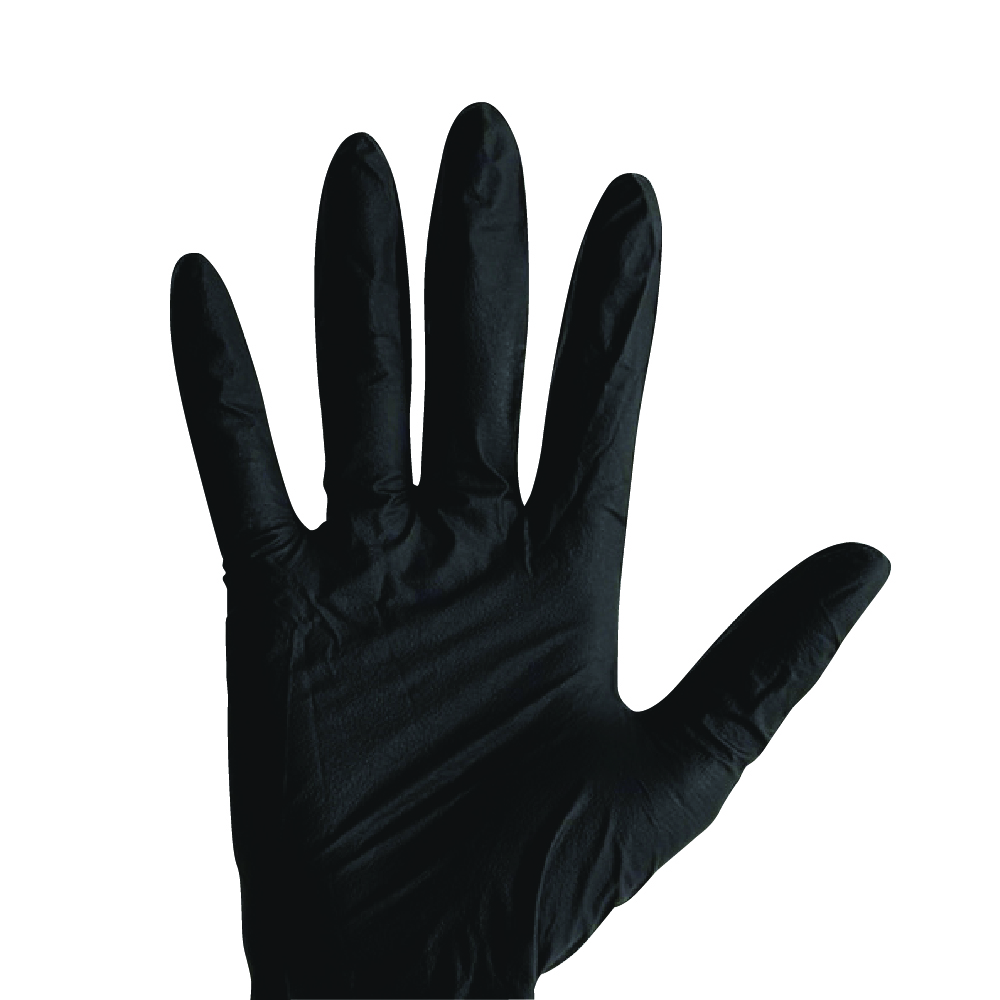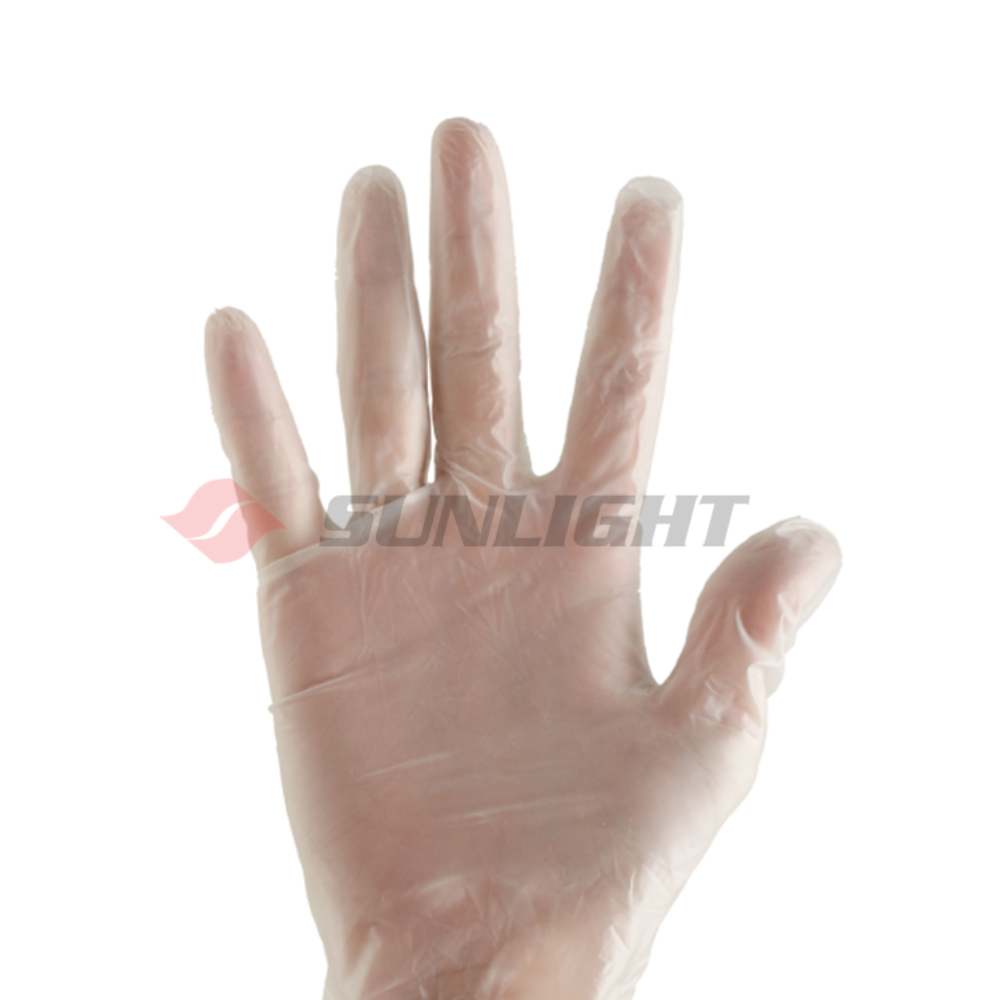Gloves
A glove is a garment worn over the hand. Gloves usually have separate openings or sheaths for each finger and the thumb.
Sunlight Paper offers:
- 2 types of disposable gloves:
- Nitrile (Acrylonitrile-butadiene rubber)
- Vinyl (Polyvinyl Chloride aka PVC)
- Powdered or Powder-free
- Black, blue or clear
- Size S (80-90mm), M (90-100mm), L (100-110mm), XL (110-120mm)
Nitrile, vinyl, and TPE gloves each have unique characteristics, making them suitable for different uses depending on the need for durability, sensitivity, and cost-effectiveness
Nitrile gloves are made from synthetic rubber NBR (Nitrile Butadiene Rubber), known for their high durability, elasticity, and puncture resistance. They offer excellent protection against chemicals, oils, and biohazards, making them ideal for medical, laboratory, and industrial applications. Nitrile gloves also provide a snug fit and enhanced tactile sensitivity.
- Pros: Strong chemical and puncture resistance, hypoallergenic, and high dexterity.
- Cons: Generally more expensive compared to vinyl and TPE gloves.
- Commonly used in: F&B - handling cooked food, food processing, automotive and mechanical, manufacturing and industrial.
- Ranking: #1 for strength, protection, and versatility.
Vinyl gloves are made from PVC (polyvinyl chloride), offering a smooth fit and a looser, more comfortable feel compared to nitrile. They are suitable for short-term, low-risk tasks such as food preparation or handling non-hazardous materials. Vinyl gloves lack the elasticity and chemical resistance of nitrile, but they are cost-effective.
- Pros: Low cost, comfortable fit, and latex-free, making them suitable for people with latex allergies.
- Cons: Lower durability, less form-fitting, and not suitable for tasks requiring high tactile sensitivity or protection from harsh chemicals.
- Commonly used in: F&B - handling raw food (blue), F&B - handling non-food related (clear), food catering, beauty and salon, cleaning and janitorial, retail and customer service.
- Ranking: #2 for affordability and general-purpose use.
Generally all the gloves can be used for multiple purposes:
| Nitrile | Vinyl | |
| General | ✔ | ✔ |
| Food prep | ✔ | ✔ |
| Cooking | ✔ | ✔ |
| Counter tasks | ✔ | ✔ |
| Dish washing | ✔ | ✔ |
| Janitorial | ✔ | ✔ |
| Exam | ✔ | |
| High risk | ||
| Power or powder-free | ✔ | ✔ |
| Latex-free | ✔ | ✔ |
See below for the price and specifications table for comparison of the 2 types of gloves:
| Nitrile | Vinyl | |
| Pricing | ||
| Price per carton | $59.90 | $42.90 |
| Price per box | $5.99 | $4.29 |
| Product Specification | ||
| S Size | 80-90mm | 80-90mm |
| M Size | 90-100mm | 90-100mm |
| L Size | 100-110mm | 100-110mm |
| XL Size | 110-120mm | 110-120mm |
| Non-Sterile | Yes | Yes |
| Powder content | All Powder-free | Clear - Powdered Blue - Powder-free |
| Packaging Specification | ||
| Packaging type | Corrugated box (carton) |
Corrugated box (carton) |
| Packaging dimensions | 31x25x24cm | 30x25x13cm |
| Boxes per carton | 10 | 10 |
| Pieces per box | 100 | 100 |
| Pieces per carton | 1000 | 1000 |
What is the difference between the 2 types of gloves?
| Nitrile | Vinyl | |
|
Level of Barrier Protection (Resistant to punctures and tears) |
Excellent | Fair |
|
Allergen Content (Contains protein and chemical allergen) |
Very Good No latex proteins but some chemical curing agents |
Very Good No natural rubber proteins and no chemical curing agents |
|
Strength and Durability (High tensile strength) |
Excellent | Very Good |
|
Elasticity (High memory, allowing the film to always return to its original shape) |
Very Good | Fair to Poor |
|
Fit and Comfort |
Very Good | Very Good |
|
Chemical Resistance (Protects from caustics and detergents) |
Excellent | Fair |
|
Economical (Price point) |
Good | Very Good |
Best Overall: Nitrile Gloves - for maximum protection and versatility.
Best Budget Option: Vinyl Gloves - for light tasks and cost-efficiency.
How about powdered or powder-free gloves? The choice between powdered and powder-free gloves depends on the intended application and the needs of the user.
Powdered gloves are coated with a small amount of cornstarch or other absorbent powder inside. This powder makes it easier to put on and take off the gloves, especially in situations where hands are moist or sweaty.
- Benefits:
- Reduces friction, making them easier to don and remove, even with damp hands.
- Minimizes the risk of tearing when putting on gloves.
- More comfortable for prolonged use as the powder helps absorb moisture.
- Drawbacks:
- The powder can cause irritation or allergic reactions for some users.
- In medical or laboratory environments, the powder may interfere with samples, contaminate surfaces, or cause respiratory issues when airborne.
- Powdered gloves have largely been phased out in clinical settings due to these contamination concerns.
Powder-free gloves are manufactured without any internal powder coating. This makes them ideal for situations where cleanliness and contamination control are crucial.
- Benefits:
- Reduced risk of contamination, making them suitable for sterile environments like surgery or laboratory work.
- Less likely to cause allergic reactions or respiratory issues.
- Preferred for food handling, cosmetics, and sensitive applications where particles must be minimized.
- Drawbacks:
- Can be slightly more difficult to put on and take off, especially when hands are moist or when prolonged use causes sweating.
- Tend to cost more than powdered gloves due to the extra manufacturing steps required to remove the powder.
Choose between powdered or powder-free?
- Medical and Clinical Use: Powder-free gloves are highly recommended due to their lower risk of contamination and allergic reactions.
- Food Handling and Preparation: Powder-free gloves are preferred to prevent food contamination.
- Industrial or General-Purpose Use: Either option can be suitable depending on comfort needs and ease of use, but powder-free is often the safer choice overall.
Ultimately, the choice between Powdered or Powder-free, Nitrile, Vinyl or TPE gloves depend on the specific requirements of the task, such as comfort, fit, durability, chemical resistance, and budget considerations. It's important to consider these factors and assess the needs of the intended application before selecting the appropriate type of glove.
Here is a 5-step instruction guide on how to use the glove right:
1) Choose a glove size that fits well and is designed for your intended use
2) Check if there are any rips or punctures
3) Always wash and dry your hands before putting on a pair of gloves
4) Never wash or reuse disposable gloves
5) Remove your gloves from the outside and be sure to wash your hands!
For other tissue and hygiene products, check out our range of Jumbo Roll Tissue, Paper Hand Towel and Garbage Bags.


